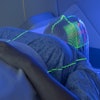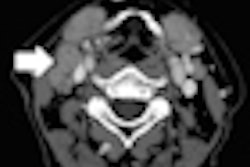The Radiation Therapy Oncology Group (RTOG) has released clinical trial results indicating that a chromosomal abnormality -- specifically, the absence of chromosomes 1p and 19q -- has prognostic and predictive value for managing the treatment of adult patients with rare brain tumors.
In the trial, the presence of the chromosomal abnormality was associated with a substantially better prognosis and near-doubling of median survival time for adult patients with pure and mixed anaplastic oligodendrogliomas when treatment with combined chemotherapy and radiation therapy was compared to treatment with radiation therapy alone.
The RTOG 9402 trial was conducted with four other cooperative groups supported by the U.S. National Cancer Institute, RTOG said. The 148-patient cohort was randomized; one study arm received chemotherapy and radiation therapy, and the other study arm received radiation therapy only.
The results showed no survival benefit for patients treated with early chemotherapy plus radiation therapy over radiation therapy alone. The researchers also found that participants in both arms whose tumors lacked chromosomes 1p and 19q had longer median survival times, compared with participants whose tumors had the chromosomes.



















